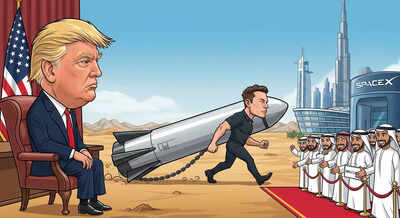Musk vs Trump: Elon Musk fan Ian Miles Cheon asks him to move space program to UAE

Image generated by AI for creative and illustrative purposes only
There’s always one tweet that distills geopolitical fantasy into 280 characters. This time, it came from Elon Musk loyalist Ian Miles Cheong:“Elon Musk should simply move his entire SpaceX operation to the United Arab Emirates.
The UAE stands at the forefront of technological progress and mankind's ascent to the stars.”The idea sounds far-fetched. But it also speaks to something very real: the UAE’s growing ambition to become a serious player in the global space race, just as Musk finds himself increasingly disillusioned with Washington, and estranged from his on-again-off-again political ally, Donald Trump.
The Musk–Trump relationship, once a spectacle of anti-establishment synergy, has hit turbulence.
Musk, long the poster boy for public-private innovation, turned sharply against Trump’s latest bloated federal spending bill, calling it a “disgusting abomination.” Trump, ever retaliatory, suggested the US could save “billions” by cutting off Musk’s federal contracts. In MAGA-speak, that’s a declaration of war.As Tesla and X stocks tanked, erasing over $150 billion in market value, Musk threatened to decommission the Dragon capsule, the spacecraft that connects Earth to the International Space Station.
That post came just minutes after Trump floated cancelling SpaceX subsidies. For a brief moment, the world’s most influential entrepreneur looked ready to break orbit, not just from Earth, but from America.That’s when the UAE entered the chat.
While the Musk-Trump bromance combusts on X, the United Arab Emirates has been quietly, and not so quietly, building the infrastructure of a spacefaring nation. The Mohammed bin Rashid Space Centre (MBRSC) in Dubai is now home to a replica Falcon 9 booster, a symbolic tribute to Musk’s engineering triumph.
In 2020, the UAE launched its Hope probe to Mars, making it the first Arab nation to embark on an interplanetary mission.
It reached Martian orbit in 2021.Unlike many space programs that began with Cold War posturing, the UAE’s ambitions are rooted in a long-term economic and technological vision. Its Mars 2117 project imagines a human settlement on the Red Planet within a century. The country has invested heavily in satellite tech, astronaut training (two UAE astronauts have now flown to space), and international partnerships with NASA, Roscosmos, and JAXA.And most crucially, it has money. Oil money. Sovereign wealth fund money. The kind of money that could theoretically bankroll a massive SpaceX relocation, if only US export laws allowed it.
While the fantasy of a SpaceX launch site in Abu Dhabi sparks excitement, it hits a hard wall named ITAR, the International Traffic in Arms Regulations. Aerospace technology like Falcon rockets and Dragon capsules is tightly controlled by the US government, especially because of SpaceX’s work with NASA and the Pentagon.
Relocating operations overseas would require navigating a minefield of national security laws, intellectual property battles, and contract obligations.Then there’s the infrastructure: SpaceX’s launch pads in Florida and Texas, its Starlink deployment network, and its deep entanglement with the US military-industrial complex. Even for someone as unpredictable as Musk, uprooting an entire space ecosystem is more fever dream than flight plan.But what is serious, and worth watching, is how quickly the idea caught fire. Because when powerful partnerships fall apart, when the emperor of disruption turns on the emperor of MAGA, imagination fills the vacuum. And the UAE, with its deep pockets and deeper ambitions, is perfectly poised to be the world’s favourite hypothetical.
The collapse of the Musk-Trump dynamic is more than just a tech billionaire breaking up with a former President.
It symbolises the end of a political alliance that once seemed like the future of American populism. Musk was the brains, Trump the brawn. Their combined disdain for bureaucracy made them the heroes of a Silicon Valley–meets–Talk Radio voter base.But now? Trump accuses Musk of “losing it” after his subsidies began to vanish. Musk retaliates by quoting House Republicans and teasing a centrist third party. Their shared fantasy of dismantling the “deep state” has devolved into petty poll wars and social media jabs.
And in that vacuum, the UAE has emerged, not as a saviour, but as a symbol of what a forward-looking, well-funded, and ideologically agnostic space agenda might look like.
The truth is, Elon Musk isn’t moving to the Emirates anytime soon. But the fact that people think he could is a testament to what the UAE has managed to build, credibility. In the span of two decades, it has gone from oil-rich sandbox to serious contender in the celestial stakes.
Its universities are training aerospace engineers. Its astronauts are flying with NASA. Its space centre has a waiting list for international collaborations.So, while the Dragon capsule remains on US soil, the battle for the future of space may not be limited to the US, Russia, and China anymore. The UAE is still in the early innings, but it's playing to win.And as for Musk and Trump? Their Cold War is far from over. But in the echoes of that fallout, a new contender has quietly entered the arena, bathed in desert light, aiming for the stars.











